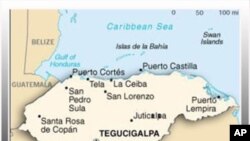The State Department said Tuesday that the United States supports the November 29 presidential election in Honduras as an "essential part" of a solution to that country's political crisis. But U.S. officials are still pushing for implementation of a deal between the interim government in Tegucigalpa and deposed President Manuel Zelaya.
In a break with some of its regional allies, the United States announced its support for the November 29 presidential election as one element of a solution to the crisis that erupted in June when President Zelaya was ousted in what most of the world branded a coup d'etat.
The Obama administration originally had said it would not recognize the election unless Mr. Zelaya was restored to power. But it altered that stance after the deposed leader and interim president Roberto Micheletti signed an agreement backed by the Organization of American States, or OAS, last month aimed at settling the conflict.
At a news briefing, State Department Spokesman Ian Kelly noted that the election, in which neither Mr. Micheletti nor Mr. Zelaya is running, is being organized by an electoral tribunal that was selected and installed in a transparent, democratic process before the coup.
He said all five candidates were nominated before Mr. Zelaya's ouster and that the interim government has dropped media curbs and human rights restrictions that potentially threatened the fairness of the campaign, making U.S. backing for the process possible.
"We see the running of these elections - assuming that they're run in a fair and transparent way - we see them as an essential part of the solution of this crisis," said Ian Kelly. "Now again, it's important that these elections be seen as free, fair and transparent, and are monitored by a credible international monitoring process. And that's exactly what we're supporting. We can't judge the outcome of something that hasn't happened yet. But the process that we see in place is a process that we are supporting."
Kelly reiterated U.S. support for the move announced by Mr. Micheletti last week, under which the interim leader will cede power for a week, beginning on Wednesday, to bolster the election's legitimacy.
At the same time, the State Department spokesman said the United States continues to press for implementation of the OAS settlement plan, known as the Tegucigalpa-San Jose Accord, which the sides in the crisis have only partially fulfilled.
A key element in the plan is a vote by the Honduran National Congress scheduled for December 2 on whether Mr. Zelaya, sheltered since September at the Brazilian embassy in the capital, should return to the presidency to complete his term in office, which was due to end in January.
At least two key Latin American governments, Brazil and Argentina, have reaffirmed that they will not recognize the results of the election. The foreign policy adviser to Brazilian President Luiz Inacio Lula da Silva, Marco Aurelio Garcia, was quoted Tuesday as calling U.S. support for the election lamentable, and an effort to "clean up" the June coup with a new election.
A senior State Department official who spoke to reporters said the election is not an attempt to "whitewash" what happened in June, and that it is unfair to reject the ballot out of hand.
He said the United States will have to decide after the vote how to judge the process. He said implementation of the Tegucigalpa-San Jose Accord continues to be a U.S. policy priority.
News
US Supports Honduran Election Process
update




